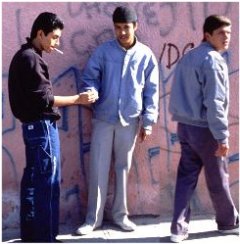 Sociologists say that boys are more vulnerable and emotionally involved in romantic relationships than previously thought. And not far beneath the bravado on display is an unsure adolescent who finds it hard to express emotions, says the new study in the American Sociological Review. Surprisingly, the study also found that contrary to traditional belief, girls scored higher than their male romantic partners in terms of decision-making power.
Sociologists say that boys are more vulnerable and emotionally involved in romantic relationships than previously thought. And not far beneath the bravado on display is an unsure adolescent who finds it hard to express emotions, says the new study in the American Sociological Review. Surprisingly, the study also found that contrary to traditional belief, girls scored higher than their male romantic partners in terms of decision-making power. Sociologist Peggy Giordano, from Bowling Green State University, said that adolescent romances were an important part of growing up, and should not be discounted as merely puppy love. "These early relationships matter for boys, as well as for girls, and even though they may not last forever, the young people are taking important lessons from them about how to conduct social relationships, and about themselves and their emerging identities," said Giordano.
The researchers believe that adolescent dating experiences have not been well studied in the past, due to assumptions that such relationships are short-lived and shallow, and therefore not very influential. Rather, studies to date have focused almost exclusively on sexual behavior rather than on the relationship itself. "They [teen romantic relationships] really have important socializing influences," said co-researcher Monica Longmore.
The study found that in general, boys were far removed from the confident, dominant image seen in previous research. They reported significantly lower levels of confidence, as well as greater "communication awkwardness," in their romantic relationships. Boys as well as girls reported feelings of heightened emotions toward their current or most recent romantic partner - contrary to the notion that boys are only looking to "score" and are not emotionally invested in the relationship.
Surprisingly, boys also perceived being influenced more by girls than vice versa and, while most participants from both sexes indicated they shared equal decision-making power in their relationships, the tilt was toward the girls when power was thought to be unequal.
"Our research [suggests] that romantic relationships do play a role in development," Giordano said. "While parents and friends continue to be critically important, the romantic partner also matters in multiple respects," she added, saying the relationship "can be a life-affirming, identity-enhancing element of one's development."
Based on material from the American Sociological Association

